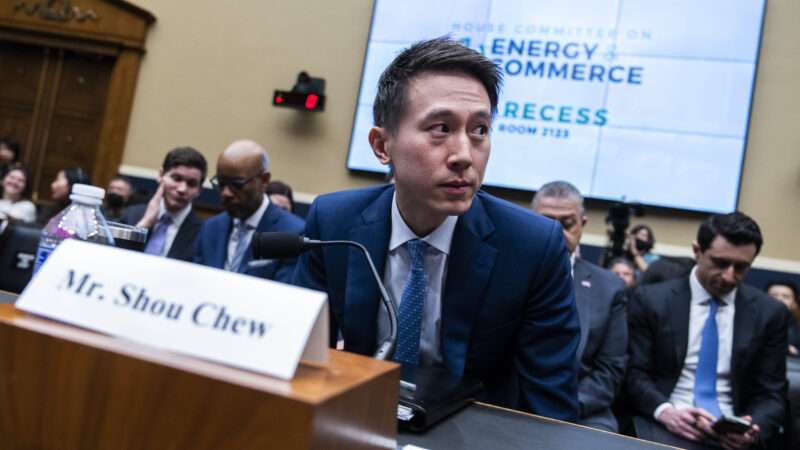
Last week, members of Congress relentlessly grilled Shou Zi Chew, the CEO of Chinese social media giant TikTok. Anger toward Chew was remarkably bipartisan: Both Republicans and Democrats consider TikTok an addictive service that harms kids, provides a vector for Chinese government propaganda, and captures the personal data of millions of Americans.
These concerns are not entirely unfounded. The Chinese government's thirst for censorship is well documented: The Chinese Communist Party (CCP) has gone to great lengths to prohibit content relating to Winnie the Pooh wherever it might appear, for instance, due to the character's resemblance to President Xi Jinping. And when Google attempted to relaunch in China, the government forced the company to restrict searches relating to Tiananmen Square. Chew testified before Congress that political dissent is widely available on TikTok, but there is plenty of evidence that the social media platform has suppressed content shown in the U.S. at the Chinese government's behest.
China isn't the only one playing that game. The U.S. government has also shown great interest in controlling what information its citizens consume online. Both the Twitter Files and the Facebook Files have shown that American social media companies have faced relentless pressure to restrict speech on controversial subjects like COVID-19 vaccines, Hunter Biden, and the 2020 election. Federal agencies including the State Department, Department of Homeland Security, Centers for Disease Control and Prevention (CDC), the FBI, and even the White House have all communicated with moderators at social media companies, urging them to take action against legal speech.
The U.S. government's behavior on this front has been so disreputable—so thoroughly at odds with the principles of the First Amendment—that all Americans should be deeply skeptical of efforts by federal lawmakers and bureaucrats to claim for themselves even more power over tech platforms. But that's precisely the point of the TikTok hearings: to give Congress a pretext to unilaterally ban TikTok.
It's worth repeating that TikTok's position as an entity beholden to the CCP is genuinely worrying, and though investigators have not produced much compelling evidence of genuine malfeasance in the data-collection category, no one should be overly naive about the CCP's capabilities. As the Foundation for Individual Rights and Expression (FIRE) noted in a statement about banning TikTok: "We recognize the significant national security threat posed by troves of sensitive information in the hands of an adversarial government. The legal obligations of Chinese companies with regard to data sharing with the Chinese Communist Party are startling."
Even so, FIRE rightly frets that banning TikTok would ultimately "shut down an immensely popular means of communication for the tens of millions of Americans who use the app every day to share and consume information, news, ideas, political advocacy, and creative content." TikTok, as FIRE points out, is a vital platform for people to engage in free expression—including and especially young people. The U.S. government taking action against the platform is itself an act of vast censorship.
Worse still, there is every reason to think the U.S. government will misuse this newfound power to unilaterally banish specific social media platforms. The Restrict Act, a bipartisan bill that would authorize the Commerce Department to take action against TikTok also empowers it to "deter, disrupt, prevent, prohibit, and mitigate transactions involving information and communications technology products in which any foreign adversary has any interest and poses undue or unacceptable risk to national security." The bill is supported by the Biden administration.
But the Biden administration's FBI has taken the position that American social media companies were infiltrated by Russian bots and that companies like Twitter are failing democracy by refusing to censor even more content. Mainstream media outlets and a coalition of government-supported think tanks have incorrectly accused social media platforms of being little more than useful idiots for Russian-backed disinformation campaigns.
Should we expect the veritable army of federal bureaucrats obsessed with policing speech on social media platforms to narrowly utilize this new mandate to deter foreign threats and focus solely on the CCP? Or should we anticipate that every weapon added to their arsenal is a threat to the free speech rights of everyday Americans?
If the U.S. government really wants to counter Chinese tyranny, it should take greater pains not to resemble China's own approach to speech. Confusingly, some media commentators who oppose TikTok on grounds that the Chinese government is an enemy seem to almost admire the CCP's preference for state-issued propaganda. Zaid Jilani, a reporter at News Nation, and Batya Ungar-Sargon—my friend and co-host of The Hill's news show, Rising—both observed recently that China does not grant its citizens full access to TikTok. The Chinese version of TikTok, notes Ungar-Sargon, "kicks off kids after 40 minutes of use, and much of the content is taken up with educational videos about how to garden and how to be a good citizen."
China is run by a government that denies its citizens fundamental free speech rights. It denies them full political rights. It is complicit in genocide. Its COVID-19 lockdowns were among the most repressive in the world. And it has covered up information about the pandemic's origin. The CCP's habit of restricting kids' access to uncensored content and propagandizing them into "good citizenship" is authoritarian; American lovers of freedom should recoil, not seek to emulate this.
We should be especially wary of equipping our own government with similar tools. Today, TikTok—tomorrow, who knows?
The post Banning TikTok Is a Power the Federal Government Doesn't Deserve appeared first on Reason.com.







